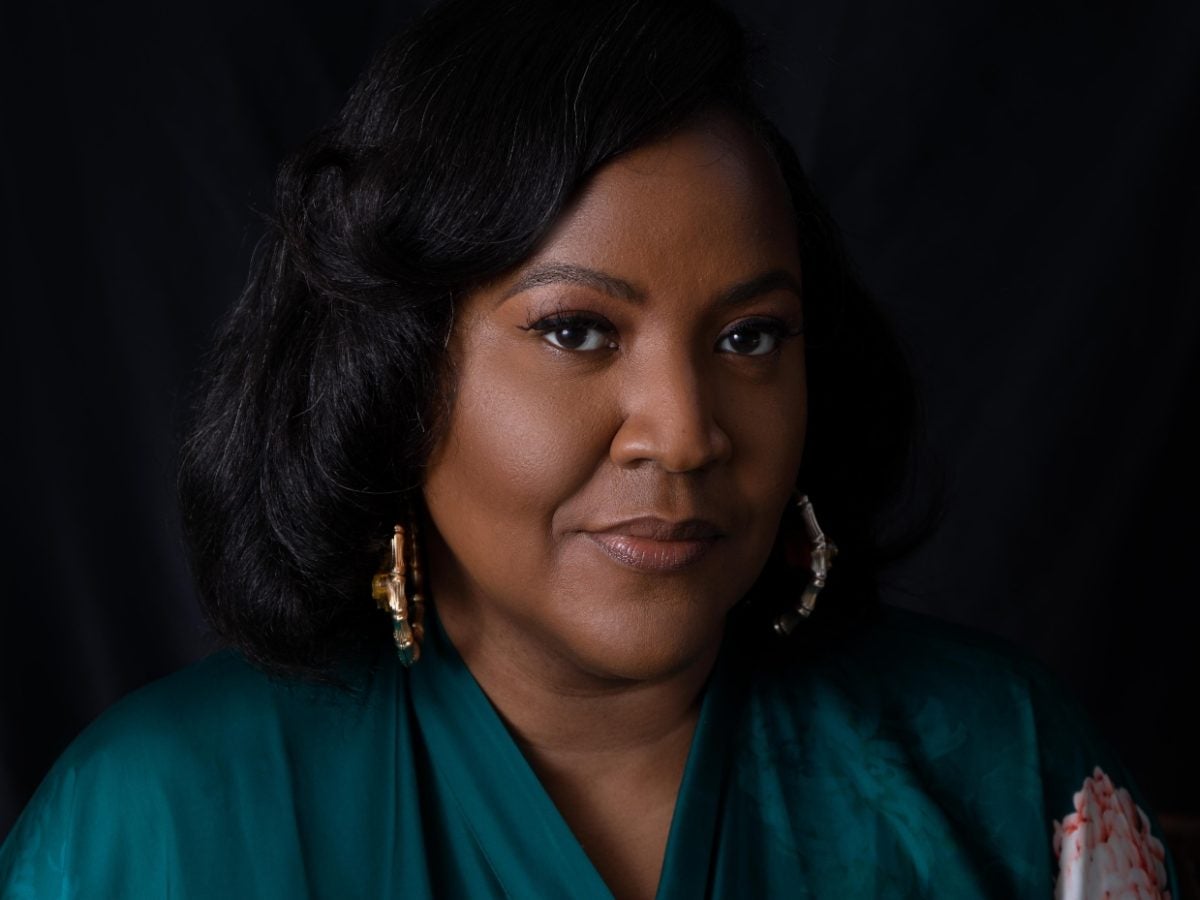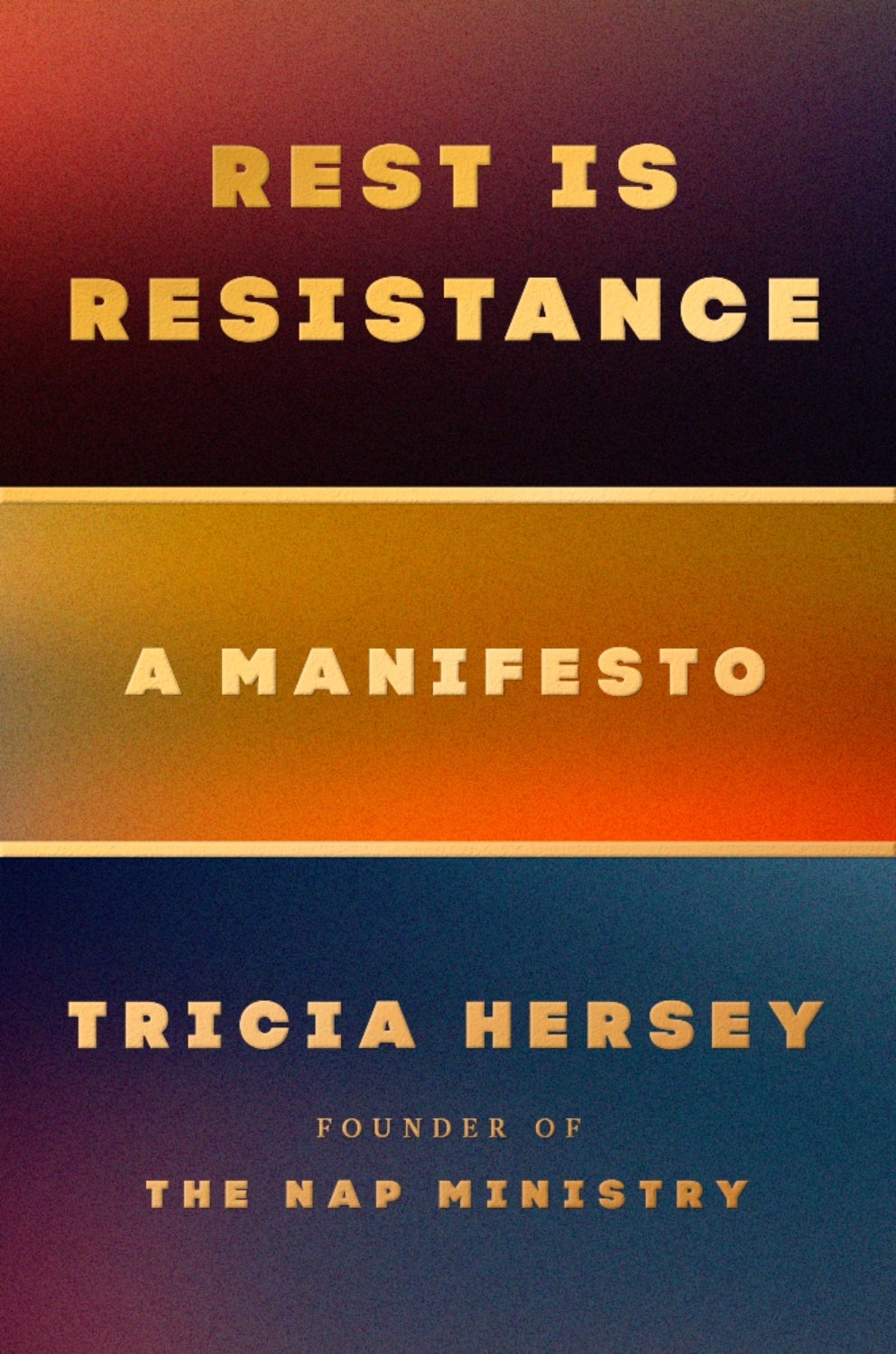
Tricia Hersey is tired.
“I’ve been feeling like I want to go to a ranch in Jamaica, a mountain somewhere where there’s no Wi-Fi, and lay down,” she tells ESSENCE. Hersey, the activist, theologian, performance artist and mind behind the organization and popular social media page The Nap Ministry, is always down for some rest. But she’s in need of it now more than ever after completing her very first book, Rest Is Resistance: A Manifesto, due to be released Oct. 11. She’s been working on the book for two years, through a pandemic which brought plenty of sickness, death and exhaustion, through tight publishing industry deadlines and while parenting and handling the needs of everyday living.
“Because of that, there’s been moments when I thought I wasn’t going to be able to get through it,” she admits. “I just leaned on God and my ancestors, and the idea that I wasn’t doing this just for me. This is a legacy project. It’s a piece that I feel is important and needs to be out in the literary canon for the world to have, and to engage with.”
Promoting the necessity of rest and the act of protest that it can be in a society getting too comfortable with burnout began long before she started work on this book. Hersey, who grew up watching her grandmother and mother prioritize forms of rest daily and started to do the same in graduate school, has been doing activist work for 20 years. She specifically launched The Nap Ministry organization, her latest project, in 2016, doing community work to get people to see that the hustle culture we’ve been conditioned to believe is normal, and the idea of there being no time available to slow down, is problematic and a lie. But the work became even more timely as people tried to balance everything with a life-altering pandemic.
“It’s not normal to be sleep-deprived and exhausted, and to have tiredness as a lifestyle. That’s not why we were born. That’s not why the miracle of birth happened. It’s not what our ancestors would’ve wanted. And so the time has always been right for this message,” she says.
“This culture doesn’t allow us a moment to collectively grieve, to have space, to just be, to have leisure, to really be a human being,” she adds. “So yeah, it’s important that it gets out here.”
The work, broken down in four parts (Resting, Dreaming, Resist and Imagine) is a plan of action to help people challenge the idea that our bodies are machines to be used for capitalism’s profit as opposed to truly belonging to us. It’s about disrupting that belief, fully pushing back against a system that calls you “lazy” for not wanting to work around the clock. A system that she says got its start on the plantation.
“It pushes back against the lies of white supremacy and capitalism, that’s what rest does,” she says. “The book is simply just a field guide, a beginning. It’s a tool.”

The book is dedicated to the ancestors, including the likes of Harriet Tubman, and her grandmother Ora, as well as the many known and unknown Black people who gave of their labor, their lives, bodies stolen for capitalism’s aims.
“This simply is a ‘no’ from one person. I’m this exhausted, curious Black woman who simply said, ‘No, you can’t have me. I push back, I disrupt. I don’t belong to the systems. I’m not donating my body to this and let the chips fall where they may,” she says.
Hersey hopes Rest Is Resistance will help people see things differently, from what productivity is, to what it means to rest for the “I don’t have time” skeptics. Rest can certainly mean much more than sleeping.
“There’s always time to rest,” she says. “To me, resting is anything that connects your mind and body, that slows you down enough that you can connect those two entities. And it can look like so many things. It can look like not answering a phone call immediately, detoxing off of social media.”
She adds, “It also looks like a slower pace of life. Having boundaries, getting therapy so you can heal from your people-pleasing. Understanding that the superwoman syndrome and myth is a lie that’s trying to kill you. Beginning to really heal the collective individual trauma that has us so wrapped up in a place that we’re believing what a toxic system is telling us.”
But she’s clear on the fact that there will always be people who will push back against her message. Hersey is fine with that. Those who are ready to do the work, like the thousands of people who increased her Nap Ministry page from 20,000 to 250,000 followers in the pandemic, will continue to be open to receiving that message and sharing it.
“I’m a Black woman, I’m a Black queer poor woman, who has come from a legacy of poverty, first in my family to graduate college. So I understand where I’m at. I know that a woman talking anti-capitalist, talking about white supremacy and attempting to organize people so that they can be free in a culture like this, telling Black people and really telling the world that is a problem,” she says. “But I don’t have an issue being a problem. I don’t have an issue speaking truth to power.”
So yes, all that work, from the book to her daily efforts, including the opening of a rest temple in Atlanta this month for people to slow down and get educated on this work, is worth it. Nevertheless, it’s taxing. That’s why she’ll take the advice she gives her followers, giving herself permission to go “Go lay down.” She’s ending the year by unplugging from all the stressors of the world starting in November once the book is out and her commitments to promoting it have concluded. She’ll be practicing what she preaches.
“It’s been just a practice of mine. I go offline, I’m off the phone, I’m no emails, no bookings, no speaking about work,” she says. “And so two years of writing a book, the stress and pressure of doing that has really made me decide, ‘Go ahead and ride out the year. Give yourself that time to recuperate and recover and to really disconnect and get centered and continue to be rested,'” Hersey says. “And so I’m going to do that.”





